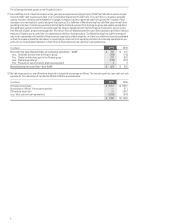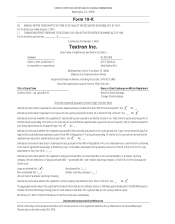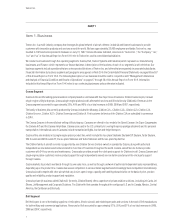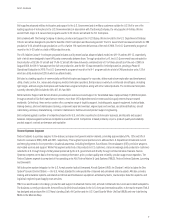E-Z-GO 2009 Annual Report Download - page 18
Download and view the complete annual report
Please find page 18 of the 2009 E-Z-GO annual report below. You can navigate through the pages in the report by either clicking on the pages listed below, or by using the keyword search tool below to find specific information within the annual report.
9
Textron Inc.
profitability of the captive finance business, is largely dependent on our ability to obtain funding at a reasonable cost. This ability and cost, in turn,
are dependent on our credit ratings and are subject to credit market volatility. If we are unable to continue to offer customer financing or if we are
unable to offer competitive customer financing, it could negatively impact our Manufacturing group’s ability to generate sales, which could
adversely affect our results of operations and financial condition.
The soundness of our suppliers, customers and business partners could affect our business and results of operations.
All of our segments are exposed to risks associated with the creditworthiness of our key suppliers, customers and business partners, including
automobile manufacturers and other industrial customers, customers of our Bell and Cessna products, home improvement retailers and original
equipment manufacturers, many of which have been and may continue to be adversely affected by the volatile conditions in the financial markets.
These conditions could result in financial instability or other adverse effects at any of our suppliers, customers or business partners. The
consequences of such adverse effects could include the interruption of production at the facilities of our customers or suppliers, the reduction,
delay or cancellation of customer orders, delays in or the inability of customers to obtain financing to purchase our products and bankruptcy of
customers or other creditors. Any of these events may adversely affect our cash flow, profitability and financial condition.
We have customer concentration with the U.S. Government.
During 2009, we derived approximately 31% of our revenues from sales to a variety of U.S. Government entities. Our U.S. Government revenues
have continued to grow both organically and through acquisitions. Our ability to compete successfully for and retain U.S. Government business is
highly dependent on technical excellence, management proficiency, strategic alliances, cost-effective performance, and the ability to recruit and
retain key personnel. Our revenues from the U.S. Government largely result from contracts awarded to us under various U.S. Government
defense-related programs. The funding of these programs is subject to congressional appropriation decisions. Although multiple-year contracts
may be planned in connection with major procurements, Congress generally appropriates funds on a fiscal year basis even though a program may
continue for several years. Consequently, programs often are only partially funded initially, and additional funds are committed only as Congress
makes further appropriations. The reduction or termination of funding, or changes in the timing of funding, for a U.S. Government program in
which we provide products or services would result in a reduction or loss of anticipated future revenues attributable to that program and could
have a negative impact on our results of operations. While the overall level of U.S. defense spending has increased in recent years for numerous
reasons, including increases in funding of operations in Iraq and Afghanistan and the U.S. Department of Defense’s military transformation
initiatives, we can give no assurance that such spending will continue to grow or not be reduced. Significant changes in national and international
priorities for defense spending could impact the funding, or the timing of funding, of our programs, which could negatively impact our results of
operations and financial condition.
U.S. Government contracts may be terminated at any time and may contain other unfavorable provisions.
The U.S. Government typically can terminate or modify any of its contracts with us either for its convenience or if we default by failing to perform
under the terms of the applicable contract. A termination arising out of our default could expose us to liability and have an adverse effect on our
ability to compete for future contracts and orders. If any of our contracts are terminated by the U.S. Government, our backlog would be reduced, in
accordance with contract terms, by the expected value of the remaining work under such contracts. In addition, on those contracts for which we
are teamed with others and are not the prime contractor, the U.S. Government could terminate a prime contract under which we are a
subcontractor, irrespective of the quality of our products and services as a subcontractor. In any such event, our financial condition and results of
operations could be adversely affected.
As a U.S. Government contractor, we are subject to a number of procurement rules and regulations.
We must comply with and are affected by laws and regulations relating to the formation, administration and performance of U.S. Government
contracts. These laws and regulations, among other things, require certification and disclosure of all cost and pricing data in connection with
contract negotiation, define allowable and unallowable costs and otherwise govern our right to reimbursement under certain cost-based U.S.
Government contracts, and restrict the use and dissemination of classified information and the exportation of certain products and technical data.
Our U.S. Government contracts contain provisions that allow the U.S. Government to unilaterally suspend us from receiving new contracts
pending resolution of alleged violations of procurement laws or regulations, reduce the value of existing contracts, issue modifications to a
contract, and control and potentially prohibit the export of our products, services and associated materials. In addition, we are subject to audits by
the Defense Contract Audit Agency to assure our compliance with the laws and regulations applicable to U.S. Government contractors. A violation
of specific laws and regulations could result in the imposition of fines and penalties or the termination of our contracts and, under certain
circumstances, suspension or debarment from future contracts for a period of time. Also, changes in procurement policies, budget
considerations, unexpected U.S. developments, such as terrorist attacks, or similar political developments or events abroad that may change the
U.S. federal government’s national security defense posture may affect sales to government entities. These laws and regulations affect how we do
business with our customers and, in some instances, impose added costs on our business.
























